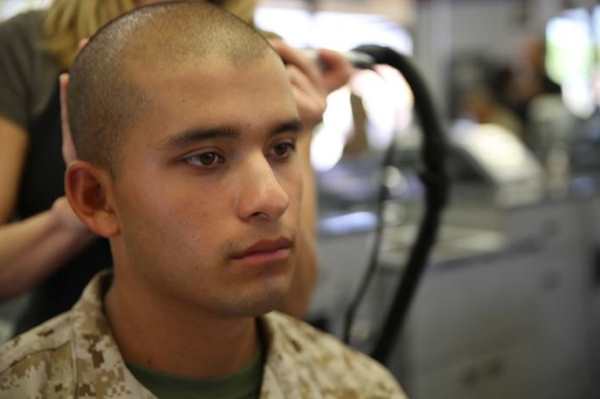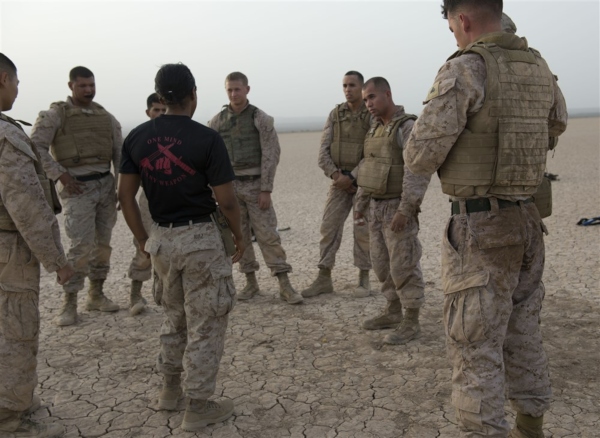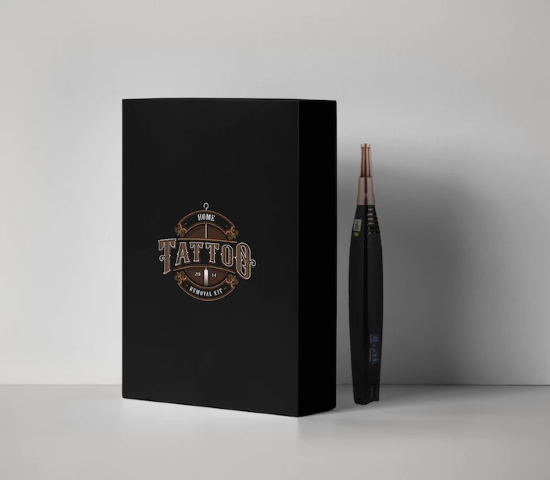The U.S. Marines Corps is considered one of the most elite forces in not only America but the world. Marines are held to extraordinarily high standards in all facets of life, including grooming standards.
Marine Corps hair regulations are stern, as are the rules related to facial hair, body piercing, and other personal hygiene.
Are you considering joining the U.S. Marines if you can make it through training? Your ambitions deserve praise. Before you get too far you should understand what your personal appearance expectations will be if becoming a fully qualified member.
Related Article: Tattoo Policy for Each Military Branch
According to the U.S. Marines Corps, members are expected to “present the best possible image at all times and continue to set the example in military presence.”
Marines Corps uniform and USMC hair regulations are established as specific as practicable in order to establish the parameters in which Marines must conduct themselves.
The official personal appearance policy of the U.S. Marines Corps notes that it is impossible to provide examples of every appropriate, as well as unacceptable, hairstyle.
In this article, however, we will break down the general expectations and what the U.S. Armed Forces often refers to as “conservative” as opposed to “eccentric” grooming and personal appearance.
Jump To A Section
Beard And Mustache Regulations
Other Regulations (Makeup, Fingernails, Lipstick, Nail polish, Cologne)
Marine Corps Hair Regulations

Since it is not possible to list every single hairstyle that is acceptable or not acceptable in the U.S. Marine Corps, the official policy states that leaders should use good judgment in deciding what is appropriate.
Enforcement of U.S. Marine Corps grooming standards is comparable to those of the U.S. Navy.
Consequently, Marine Corps hair regulations as well as other grooming standards while in uniform are expected to remain “neat and professional” at all times.
Marine haircut for men policy:
Expectations for male Marines are as defined:
- Must be kept neat and closely trimmed.
- Hair above the ears and around the neck must get tapered from the lower natural hairline upwards.
- Hair on the back of the neck may not touch the collar.
- Hair is not permitted to be longer than 3 inches and may not touch the ears, collar, extend below the eyebrows (when headgear is removed), or show under the front edge of headgear when on.
- All in all, hair must never interfere with the safety or practicality of military headgear.
- The bulk of the hair may not exceed approximately 2 inches. Bulk is defined by the U.S. Armed Forces as the distance that the mass of hair protrudes from the scalp.
- Hair coloring is only allowed in natural colors and must “complement the individual.” Faddish and “outrageous multicolored hair” is not authorized.
Like other branches of the U.S. Military, the Marines do not recognize hairstyles that are considered unique in texture or quality, such as curls or waves.

Therefore, it acknowledges that in some situations it may be difficult to maintain the taper at the back of the neck. In those circumstances, Marines are allowed to present a graduated appearance that may combine the taper with a line at the back of the neck.
Marines primarily sport cut, clipped, or shaved hairstyles. Special hairstyles (i.e. afro) are permitted if the hairstyle meets the criteria of maximum length as well as bulk. The neck and sides also must be tapered and never interfere with the proper use of military-assigned headgear.
Related Article: Top Reasons to Join the U.S. Military
Men are not allowed to have braided or plaited hairstyles when in uniform or in a duty status. During recruit training, men must have completely clipped hair to the scalp.
Sideburns must also remain neatly trimmed and tailored similar to the Marine haircut. Sideburns are not allowed to extend below the top of the orifice of the ear. The length of an individual hair of the sideburn may not exceed 1/8 inch.
Furthermore, sideburns must not flare. They should be clean shaved with a horizontal line at the area level with the middle of the ear. ”
Marine Haircuts for Women policy:
Expectations for female Marines are as defined:
-
- Females must present a professional and balanced appearance at all times.
- The appropriateness of a hairstyle is evaluated and determined based on appearance when headgear is worn.
- The hairstyle must not inhibit military-assigned headgear. It must fit snugly and comfortably around the head without “distortion or excessive gaps.”
- Hair length may extend to the uniform of the Marine collar, but not fall below the collar’s lower edge. Marines with longer hair than that may neatly pin and fasten the hair so long as it maintains a clean presentation.
- Hair is not authorized to protrude from the opening in the back of a ball cap, except when wearing a bun or ponytail. Buns and ponytails must be positioned in the back of the head to make sure headgear fits properly.
- Hair bulk (not including the bun) is measured from the scalp and is not allowed to exceed 2 inches. When the bun is also measured, the bulk must be under 3 inches.
- Lopsided or “extremely asymmetrical hairstyles” are not allowed. Angled hairstyles may only have 1 to 1/2 inch difference between the front and back length of the hair.
An exception is made during periods of physical training in which PT clothing is worn. In those circumstances, hair is allowed to fall naturally and does not need to get fastened or pinned unless it is long, in which case a ponytail is acceptable. However, the allowance does not apply when conducting PT in a utility uniform.
In general, no “trendy or eccentric styles” are authorized by the U.S. Marines when in uniform.
Braids are permitted so long as they are neatly fastened, pinned, or secured and follow the above guidelines when headgear is also used.
Related Article – Pros and Cons Of Joining The Marines
Bangs may not extend below the eyebrows. Hair, regardless if natural or artificial (wigs, hair extensions, etc), must remain a natural hair color.
The U.S. Navy (which Marines also follow in terms of many hairstyle guidelines), defines natural hair colors as blonde, brunette, red, brown, gray, or black. Hair extensions must match the current color of the rest of the hair.
Wigs and hairpieces must maintain a presentable quality and fit with a natural appearance. Highlights and special hair tints must resemble natural hair colors and look similar to the current base color.
For more guidelines on specific hairstyles authorized by the U.S. Navy and Marines, please click here.
Marine Corps Beard and Mustache Regulations

Marine mustache regs and other facial hair are closely monitored by the elite force Commanding Officers.
A few of the most important things to note:
- A Marine mustache is allowed after recruit training. The rest of the face must be clean-shaven daily.
- The mustache is only permitted when neatly trimmed and must be contained within vertical lines from the corners of the mouth to the margin area of the upper lip.
- The individual length of hair on the mustache (when fully extended) must not exceed 1/2 inch.
- Aside from a mustache, eyebrows, and eyelashes, no other facial hair is allowed by the Marines unless a medical officer has provided a waiver, or “shaving chit.”.
Facial hair grooming standards are enforced so tightly in the Marines that those that are granted a “shaving chit” should always have the paperwork on them at all times in the event they are stopped by higher-ranking Marines.
Though some Marines decide to have a mustache so long as it fits within the above guidelines, the majority of members are notoriously clean shaven.
The one exception is chest hair, which technically doesn’t fall within facial hair, but is still specified under Marine personal appearance policy.
Marines are not required to have chest hair clipped except in cases where the body hair is long enough that it protrudes in an unsightly manner above the collar.
Related Article – USMC PFT/CFT Calculator
Marine Corps Piercing Policy

Marine piercings and body art are closely monitored by the elite force.
This branch of the U.S. Armed Forces takes up a similar approach to body piercings as the U.S. Navy.
It allows jewelry that is conservative in certain instances, with female Marines having more leeway than male Marines.
Like hairstyles, the Marines provide accommodations for body piercings so long as they are not eccentric. Men are not authorized to have earrings while in uniform.
They also may not wear them in civilian attire while on duty, abroad, operating with military-owned equipment/methods of transport, or jurisdictions.
Meanwhile, women are allowed to have one earring per ear while in uniform. There are many rules as to what type of earrings are authorized.
Earrings must be between 4mm and 6mm. Approximately 1/8 to 1/4 inch, the earrings must also look plain with a specified finish. There are different standards for earrings based on the uniform being worn.
For example, more leniency is granted in Dress Uniforms than with Working and Service Uniforms.
As for body piercings, they are not authorized in the U.S. Navy or U.S. Marines. Women are only allowed to have earrings, and men are not allowed body piercings of any kind.
The rule extends to not only being in uniform but also in civilian attire when in duty status or while in/aboard U.S. Military jurisdictions. It is also not considered appropriate while participating in any organized military recreational activity.
Related Article – Navy Grooming Standards: Hair, Mustache, and Nail Regulations
Other Grooming Standards

Here are some other important considerations to have when thinking about joining the U.S. Marines Corps:
For Males:
- Fingernails: They need to be trimmed often and cleaned. Officers consider this an important part of male hygiene.
- Makeup: Male Marines are not permitted to wear conspicuous (noticeable) makeup.
For Females:
- Makeup: Cosmetics are allowed on female Marines but must be applied conservatively. They also must complement the individual complexion of the Marine.
- Lipstick: It is permitted so long as it harmonizes and doesn’t distract from overall appearance.
- Fingernails / Toenails: Nails must be no more than 1/4 inch from the tip of the finger. They must be closely maintained and cleaned.
- Nail Polish: It is allowed on female members, but once again, must not be considered eccentric or faddish. In service and dress uniform, nail polish is allowed in shades of red, from pink to burgundy. Nail polish is not allowed while wearing utilities.
Accessories like combs, barrettes, rubber bands, etc are permitted if concealed by the hair. Hairpins or bobby pins are also authorized if they remain inconspicuous.
Tattoos
We actually have a full article on the Marines Tattoo Policy here.
Read that article to get the most up-to-date info on what tattoos you can have, and which ones you can’t!
DIY type of tattoo removal, check out our review.
It’s a safe and convenient alternative to expensive visits to a laser tattoo removal professional service.
Quick Frequently Asked Questions
Are you allowed to have a beard or mustache in the Marine Corps?
Beards are not authorized. Mustaches, on the other hand, are. You need to meet certain criteria, and they are not allowed while you’re in recruit training.
Do females have their heads shaved in Marine Corps Recruit Training?
Females do not have their heads shaved in recruit training. However, if the hair length falls below the collar, they will cut it to meet the standards.
Can I have tattoos in the Marines?
Marines can have tattoos anywhere on their chest, back, torso, legs, groin area, and arms.
Are ponytails allowed?
Females are allowed to wear ponytails, provided they are positioned at the back of the head to make sure headgear fits properly.
Conclusion

The U.S. Marine Corps enforce strict standards in terms of haircuts and grooming standards. They are very comparable to the U.S. Navy, which falls under its department.
Related Article – Marine Corps MOS List and ASVAB Scores: Details Of All 123 Jobs
Marine Corps hair regulations, Marine mustache regs, and piercings are best followed with a conservative approach.
Grooming Standards for other Military Branches
Coast Guard grooming standards
Reference:
https://www.marines.mil/Portals/1/Publications/MCO%201020.34H%20v2.pdf
- Marine Corps Boot Camp Schedule - June 20, 2024
- What To Bring To Marine Boot Camp - June 20, 2024
- Marine Corps Promotion Timeline for Enlisted & Officers - June 19, 2024







My friends son is interested in joining the Marines but we were talking about ADHD issues and meds. What exactly are the rules for a high school teenager on a med for ADHD and wanting to join Marines right after Hugh school.
Hey Janet,
We actually have an entire article dedicated to this very subject, check it out here. The Marines is the trickiest branch of them all. What I do know is that if he’s currently on medication, he will definitely not be able to serve in the Marine Corps. With that said, his best bet would be to contact a recruiter directly.